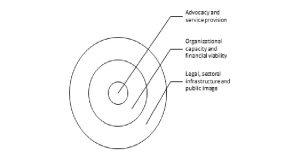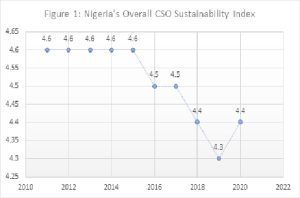IMPLICATIONS FOR PROGRAMMING – dRPC Think Piece, June 2022
CSO Sustainability Index
The Civil Society Sustainability Index (CSSI) is a tool for civil-society, governments, donors, academics, and others aims at understanding and measuring the sustainability of civil society and inform areas for investment.[1] The main objective of the CSO Sustainability Index is to report on the strength and overall viability of CSO sectors in more than 70 countries in Central and Eastern Europe and Eurasia, Asia, Sub-Saharan Africa, the Middle East and North Africa (MENA), and Mexico. Developed by the United State Agency for International Development (USAID), the Index assess the overall strength and viability of CSOs around the world and at the local level. It also provides governments as well as donors and researchers a better insight on the factors affecting the CSO sectors over a given period of time. The Index[2]:
- Allows other donor agencies to measure the success of civil society programming and inform strategic planning
- Provides capacity building service providers with a description of CSO capacity needs
- Helps advocacy organizations pinpoint and publicize issues in the legal/institutional environment that hinder CSOs’ work
Methodology
The CSO Sustainability Index analyses seven indicators which are critical to the sustainability of non-profits. The seven indicators can be clustered into 3 domains of factors in the wider environment of CSOs; within the immediate organizational system; and output factors of service provision and advocacy.

to identify both strengths and constraints in CSO development of a particular country. The seven dimensions of CSO sustainability includes[3]:
- Legal Environment – The legal and regulatory environment governing the CSO sector and its implementation
- Organizational Capacity – The internal capacity of the CSO sector to pursue its goals
- Financial Viability – The CSO sector’s access to various sources of financial support
- Advocacy – The CSO sector’s ability to influence public opinion and public policy
- Service Provision – The CSO sector’s ability to provide goods and services
- Sectoral Infrastructure – Support services available to the CSO sector
- Public Image – Society’s perception of the CSO sector
The CSO Sustainability Index score range from 1 (the most enhanced level of sustainability) to 7 (the most impeded).
- Sustainability Impeded (5.1 to 7.0);
- Sustainability Evolving (3.1 to 5.0); and
- Sustainability Enhanced (1.0 to 3.0).
Nigeria CSO Sustainability Index 2011 – 2020
The annual CSO Sustainability Index for Sub-Saharan Africa which was established in 2009 uses local CSO practitioners to ascertain the sustainability of the CSO sector in 23 African countries including Nigeria. The Sustainability Index measures the strengths and weakness in the 7 dimensions listed above of CSOs in the African continent.

![]()
Source: https://csosi.org/?region=AFRICA
Since 2011, Nigeria’s overall CSO Sustainability Index has been evolving from 4.6 in 2011 to the highest Sustainability Index 4.3 scored in 2019. As at 2020, Nigeria’s Overall CSO sustainability in Nigeria deteriorated slightly to 4.4 due to COVID-19 pandemic, protest to end police brutality and the dissolution of the Special Anti-Robbery Squad (SARS) tagged #EndSARS, President Buhari’s signing of the Company and Allied Matters Act (CAMA) 2020, which introduced stringent new provisions to regulate CSOs, tremendous economic strains as a result of the lockdown policy introduced by the government to reduce the spread of the pandemic, insecurity in the country.
Table 1: Analysis of the 7 Dimensions of the CSO Sustainability Index in Nigeria
| Year | Legal Environment | Organizational Capacity | Financial Viability | Advocacy | Service Provision | Sectoral Infrastructure | Public Image |
| 2011 | 4.9 | 4.7 | 5.5 | 3.7 | 4.2 | 5 | 4 |
| 2012 | 4.9 | 4.7 | 5.5 | 3.7 | 4.1 | 5 | 4 |
| 2013 | 4.9 | 4.8 | 5.5 | 3.7 | 4.1 | 5 | 4 |
| 2014 | 4.9 | 4.9 | 5.6 | 3.7 | 4.1 | 5 | 4 |
| 2015 | 4.9 | 4.9 | 5.7 | 3.6 | 4.1 | 5 | 4 |
| 2016 | 4.8 | 4.9 | 5.7 | 3.5 | 4 | 4.9 | 3.9 |
| 2017 | 4.9 | 4.8 | 5.6 | 3.4 | 4 | 4.9 | 3.9 |
| 2018 | 4.9 | 4.8 | 5.5 | 3.2 | 3.9 | 4.8 | 3.8 |
| 2019 | 5 | 4.7 | 5.5 | 3 | 3.7 | 4.8 | 3.8 |
| 2020 | 5.2 | 4.8 | 5.7 | 2.8 | 3.6 | 4.7 | 3.7 |
Source: https://csosi.org/?region=AFRICA
Table 1: Analysis of the 7 Dimensions of the CSO Sustainability Index in Nigeria
| Change between
2011 to 2020 |
Legal Environment | Organizational Capacity | Financial Viability | Advocacy | Service Provision | Sectoral Infrastructure | Public Image |
| -0.3 | -0.1 | -0.2 | 0.9 | 0.6 | 0.3 | 0.3 |
Source: https://csosi.org/?region=AFRICA
Based on the seven dimensions, the Legal Environment, Organizational Capacity, and Financial Viability of CSOs in Nigeria has been deteriorating from 2011 to 2020. Since 2011, the legal environment has deteriorated from 4.9 to 5.2 in 2020. CSO organizational capacity has also declined slightly from 4.7 in 2011 to 4.8 in 2020. Also declined is the financial viability (from 5.5 in 2011 to 5.7 in 2020). On the contrary, CSOs in Nigeria have improved in the following areas. Namely – Advocacy (from 3.7 in 2011 to 2.8 in 2020), Service Provision (from 4.2 in 2011 to 3.6 in 2020), Sectoral Infrastructure (from 5 in 2011 to 4.7 in 2020), and Public Image (from 4 in 2011 to 3.7 in 2020).
Implications for CSO engagement in Nigeria
Table one, above, reveals a significant improvement in Nigerian CSOs profile in the areas of service delivery and the conduct of advocacy between the period 2011 to 2020. Of the seven data points for assessing CSO sustainability it is significant that these are the only two tangible output related indicators. Environmental factors such as sectoral infrastructure, legal environment and public image do not indicate significant improvements in CSO sustainability. Application of the two organizational indicators of sustainability point to a situation of weakened financial viability and organizational capacity. Taken together, these findings point to paradox where Nigerian CSOs are delivering increasing social value in the areas of service delivery and advocacy within a context of reducing environmental and organizational enabling factors. This finding suggests that without increased investment in environmental and organizational enablers it is unlikely that Nigerian CSOs will be able to continue delivering services and conducting effective advocacy. To respond this paradoxical Nigerian reality interventions to strengthen the sustainability of CSOs must work to strengthen CSOs as organizational as well as the wider environment in which they exist and contribute to social change.
[1] Civil Society Organization Sustainability Index (CSOSI) | Project Descriptions | Timor-Leste | U.S. Agency for International Development (usaid.gov)
[2] https://www.ngoconnect.net/civil-society-organization-sustainability-index-0
[3] https://www.ngoconnect.net/civil-society-organization-sustainability-index-methodology-0




